Kansas DHP Newsletter - Spring 2021
In this Issue:
- Director Greeting
- Lawrence Community Garden Now More Accessible
- Consumer Advisory Board Profile: Olenick Champions Health, Political Representation for People with Disabilities
- Accessible Recreation Resource
- Hall Elected to NASI
- Hall and Nary Author Book Chapters
- Stoplight Healthy Living Adds Partners, Monthly Health Message
- Oral Health Resources Update
- WoWii Update
- Koon Receives KU Research Grant
- Coulter to Participate in Mentoring Circles
- Kansas DHP, Special Olympics Kansas, and LEND to Partner on Health and Disability Training
- Kansas DHP and Douglas County Health Department Partner on Testing and Vaccine Access
- 2021 National Survey on Health and Disability Services (NSHD) Available
- Iowa Public Service Announcement on Diabetes Management
- Nary Takes on Advisory Role with Kansas Department of Transportation
- Publications
- Presentations
Greetings from the Director
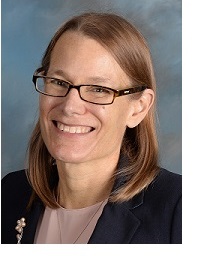 Greetings from the Kansas DHP!
Greetings from the Kansas DHP!
The yearlong COVID-19 pandemic has challenged us in many ways, requiring us to adapt program delivery to online formats and reminding us of long-standing disparities in health care access for people with disabilities. Kansas DHP’s most recent response has been working with local health authorities to improve accessibility of COVID-19 testing and vaccination opportunities.
Many of us will soon welcome spring weather and the opportunities for outdoor physical activity and community participation it provides. Kansas DHP staff have been busy promoting inclusion of people with disabilities in many ways, including improving the accessibility of the Lawrence Community Garden, indexing accessible recreation opportunities across the state of Kansas, and winning a research grant to study the ways technology like Fit Bits can motivate physical activity.
We thank you for your partnership and support as we work to promote the health of Kansans with disabilities. We are always trying to expand our reach. If you know of health professionals who would like to receive informational materials from Kansas DHP, please contact kbruns@ku.edu.
Yours in good health,
Jean Hall, Director
Kansas Disability and Health Program
Lawrence Community Garden Now More Accessible
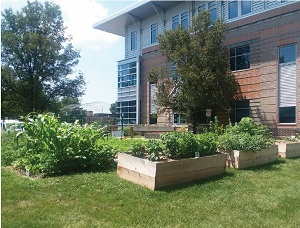 Jay Schulz, a graduate research assistant with the Kansas DHP, worked with Lawrence-Douglas County Public Health to improve access to the Lawrence Community Garden. Improvements include four large, two foot tall, raised beds; two wheelchair accessible raised beds; and accessible signage that includes large, clear pictures, ADA-compliant text, and Braille labels. In addition to promoting greater community participation for Lawrence residents with disabilities, the garden increases access to free, healthy foods for low-income families in the Lawrence community.
Jay Schulz, a graduate research assistant with the Kansas DHP, worked with Lawrence-Douglas County Public Health to improve access to the Lawrence Community Garden. Improvements include four large, two foot tall, raised beds; two wheelchair accessible raised beds; and accessible signage that includes large, clear pictures, ADA-compliant text, and Braille labels. In addition to promoting greater community participation for Lawrence residents with disabilities, the garden increases access to free, healthy foods for low-income families in the Lawrence community.
Consumer Advisory Board Profile: Olenick Champions Health, Political Representation for People with Disabilities
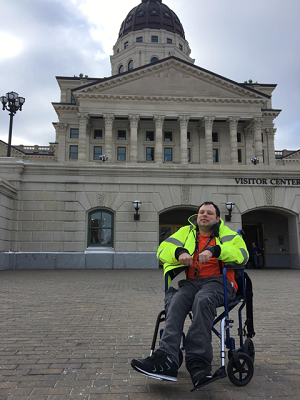 “It’s a dream come true,” says Colin Olenick of his job with the Self Advocate Coalition of Kansas (SACK), where he has worked since 2018. “Doing what I love—advocating for myself and therefore for people with disabilities—is a dream come true.”
“It’s a dream come true,” says Colin Olenick of his job with the Self Advocate Coalition of Kansas (SACK), where he has worked since 2018. “Doing what I love—advocating for myself and therefore for people with disabilities—is a dream come true.”
Olenick, who has cerebral palsy, autism, and ADHD, has been doing what he loves since he was a child, and he credits his family and his community with his success. In 1985, his family moved to Prairie Village, where his parents gave him his start with self-advocacy as he learned to navigate the schools. The family then extended their efforts to the rest of the community, trying to improve accessibility. Johnson County, he says, “has been good to me. Not everyone is lucky to have the resources I had. I was mainstreamed in school. Johnson County has good schools, recreational opportunities. I attended Johnson County Community College; it was a wonderful experience. I feel a lot better for it, to have a community that is so receptive to my needs.”
Today, he trains self-advocates at SACK and works with the state on behalf of consumers, so people with disabilities “have a say and a hand in policymaking.”
His work with SACK led him to the Consumer Advisory Board, where he has enjoyed learning more about perceptions of disability and how people can advocate for themselves when working with healthcare providers. “I think people look at disability and think, that’s them. And we don’t have the need for other health care like dental, mental health. A majority of people with disabilities in Kansas are at least missing a tooth. It’s a big concern; people overlook basic things like cleanings for people with disabilities.”
His involvement with CAB has also presented a welcome opportunity to learn more about Special Olympics Kansas. A swimmer and former Special Olympics athlete himself, he appreciates the health benefits of swimming and the work Special Olympics Kansas does to promote the health of people with disabilities.
When he isn’t working, he collects patches from firehouses across the country—a hobby he has kept up since childhood. “I had surgery at the Rehabilitation Institute in Chicago,” he recalls. “My dad found a firehouse and we went there every time we were in town and I loved it. The firemen were so great.” Today, his collection includes patches from firehouses as nearby as Denver, where he was born, and as far away as Honolulu and his dad’s birthplace, Chester, Pennsylvania.
Though Olenick has had his share of successes, he reminds us there is much work to be done. Affordable housing is an issue he looks forward to working on, and people’s attitudes toward the health of people with disabilities can still change for the better. “Disability and Health Program is a wonderful program, and you guys should keep doing it because it points out that people with disabilities have regular health needs just like everyone else.”
Accessible Recreation Resource
Kansas DHP is compiling a list of accessible recreation opportunities across the state of Kansas. The list includes recreational programs, like adaptive sports programs, that are inclusive of people with disabilities, and recreational sites, such as parks and trails that provide access to people with disabilities. New opportunities are added each week with a view to eventually list opportunities in every Kansas county. If you know of a program or site that could be featured on the list, contact Dot Nary at dotn@ku.edu.
Hall Elected to NASI
Jean Hall, DHP Director, joined 55 other distinguished experts in being elected to the National Academy of Social Insurance (NASI) this year. NASI educates the public on the connections between social insurance--such as Workers Compensation, Unemployment Insurance, and Medicare--and economic security. "It is essential to include various types of expertise and disciplines when it comes to the challenges we face - from the impacts of COVID-19 to systemic racism in our society and economy," William Arnone, the Academy's CEO, said of the recent elections. NASI Press Release: DHP Director Elected to Academy of Social Science (NASI).
Hall and Nary Author Book Chapters
Jean Hall and Dot Nary have each authored a chapter for the new book, Public Health Perspectives on Disability: Science, Social Justice, Ethics and Beyond (2nd edition). In “The Interrelationship of Health Insurance and Employment for People with Disabilities,” Hall evaluates how access to adequate health insurance affects the health and employment of people with disabilities or chronic illnesses. Nary and Lindsey Mullis of the University of Kentucky wrote the chapter “Disability and Health Programs: Emerging Partners,” which describes the development of state disability and health programs and the continuing challenges to meeting the health needs of individuals with disabilities.
A quarter of the adult population of the United States has a disability, making people with disabilities the largest minority group in the country. Research confirms that people with disabilities experience significant health disparities. Too often, research and policy on disability focus on medical determinants of health. Public Health Perspectives on Disability considers the field of public health to be the practice of social justice using science-based strategies that improve population health, which requires a strong focus on social determinants of health such as housing, geographical location, education, and employment.
Stoplight Healthy Living Adds Partners, Newsletter
Stoplight Healthy Living is pleased to announce two new partners: Quest 1821 in Leavenworth and The Looking Glass in Wichita. Implementation of Stoplight Healthy Living also continues in partnership with Special Olympics Kansas and ResCare.
The program recently began distributing Stoplight Signals, a monthly health message for organizations that have implemented Stoplight Healthy Living in the past. The health message provides additional information and support, so past program participants can continue to make healthy nutrition and physical activity choices.
Visit the Quest 1821 website. | Visit the ResCare Community Living website.
Pictured: Stoplight Healthy Living participants enjoy a healthy snack
Oral Health Resources Available
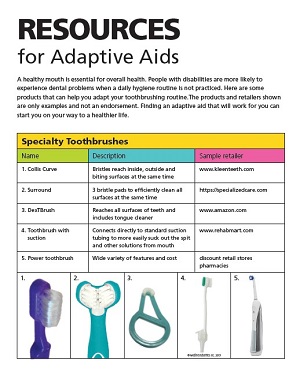 In partnership with Oral Health Kansas, Kansas DHP developed two resources for improving oral health among people with mobility or physical limitations: Changing It Up and Resources for Adaptive Aids. These resources provide toothbrushing tips and ideas for adaptive aids that might be helpful for people who have experienced strokes or have physical disabilities that make it difficult to practice good oral health. DHP staff are available to provide a virtual presentation on the two documents, which are available at the Kansas DHP Website.
In partnership with Oral Health Kansas, Kansas DHP developed two resources for improving oral health among people with mobility or physical limitations: Changing It Up and Resources for Adaptive Aids. These resources provide toothbrushing tips and ideas for adaptive aids that might be helpful for people who have experienced strokes or have physical disabilities that make it difficult to practice good oral health. DHP staff are available to provide a virtual presentation on the two documents, which are available at the Kansas DHP Website.
WoWii Update
The Workout on Wheels internet intervention (WoWii) has enrolled ten participants, who are currently completing weekly, online learning sessions which focus on various aspects of health and exercise engagement. Participants work together to set SMART goals, seek support, address barriers to exercising, hold each other accountable, and have fun. Each participant will try to complete 150 minutes of exercise per week.
Koon Receives KU Research Grant
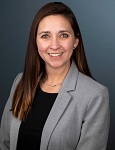 Dr. Lyndsie Koon was awarded a two-year, $20,000 grant from the New Faculty General Research Fund of the University of Kansas Office of Research. Her proposal "Self-determination through technology: Understanding physical activity engagement for manual wheelchair users" is aimed at discovering the ways activity technology, such as Fit Bits, can motivate manual wheelchair users to increase their physical activity.
Dr. Lyndsie Koon was awarded a two-year, $20,000 grant from the New Faculty General Research Fund of the University of Kansas Office of Research. Her proposal "Self-determination through technology: Understanding physical activity engagement for manual wheelchair users" is aimed at discovering the ways activity technology, such as Fit Bits, can motivate manual wheelchair users to increase their physical activity.
Coulter to Participate in Mentoring Circles
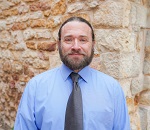 Seth Coulter, Kansas DHP’s communication specialist, has been accepted to the 2021 cohort of the University of Kansas Mentoring Circles for Disability Inclusion. The Mentoring Circles Program, which culminates in a capstone project, intends to broaden participants’ perspectives on disability inclusion and teach participants how to promote a more inclusive workplace. The program also includes an overview of the disability rights movement, the Americans with Disabilities Act, employment accommodations, and microaggressions.
Seth Coulter, Kansas DHP’s communication specialist, has been accepted to the 2021 cohort of the University of Kansas Mentoring Circles for Disability Inclusion. The Mentoring Circles Program, which culminates in a capstone project, intends to broaden participants’ perspectives on disability inclusion and teach participants how to promote a more inclusive workplace. The program also includes an overview of the disability rights movement, the Americans with Disabilities Act, employment accommodations, and microaggressions.
Kansas DHP, Special Olympics Kansas, and LEND Program to Partner on Health and Disability Training
Kansas DHP, Special Olympics Kansas, and the KU Medical Center’s Leadership Education in Neurodevelopmental and Related Disabilities (LEND) Program will partner to expand the KU Medical Center’s health and disability curriculum. Kansas DHP and Special Olympics Kansas will bring expertise on best practices for working with people with Intellectual and/or Developmental Disabilities, and the new KUMC Chapter of the American Academy of Developmental Medicine and Dentistry will facilitate additions to the medical school curriculum. The effort promotes more robust training in disability topics for doctors, nurses, and other health care professionals.
Kansas DHP and Douglas County Health Department Partner on Testing and Vaccine Access
The COVID-19 vaccine rollout holds great promise for a pandemic-weary nation. However, people with disabilities report problems with access at testing and vaccine sites. Kansas DHP recently met with staff at the Lawrence-Douglas County Health Department to explore ways to support them in making testing and vaccination opportunities more accessible. Efforts will include working with disability service providers to provide transportation and disseminate information.
2021 National Survey on Health and Disability (NSHD) Available
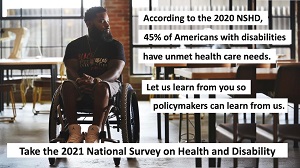 2021 National Survey on Health and Disability (2021) is now available to adults over the age of 18. The survey is anonymous and your responses help with our on-going research to improve health care services and access for people with disabilities and/or chronic health conditions. It is especially important we hear from people all over the country during the Covid-19 pandemic. And you can enter a drawing to win one of fifteen $100 gift cards.
2021 National Survey on Health and Disability (2021) is now available to adults over the age of 18. The survey is anonymous and your responses help with our on-going research to improve health care services and access for people with disabilities and/or chronic health conditions. It is especially important we hear from people all over the country during the Covid-19 pandemic. And you can enter a drawing to win one of fifteen $100 gift cards.
Iowa Public Service Announcement on Diabetes Management
Kansas DHP continues its support of national efforts to raise awareness of effective diabetes management for people with intellectual disabilities. Follow Kansas DHP on Facebook to participate in the campaign, or watch the new video, Diabetes Not Alone, on YouTube.
Nary Takes on Advisory Role with Kansas Department of Transportation

Dot Nary is serving on the advisory team for the Kansas Department of Transportation’s (KDOT) first Active Transportation Plan (ATP) in 25 years. The ATP will look at the needs of people who walk, cycle, use mobility assistance devices, scoot, and more, with the goal of reducing motorized transportation by creating environments that encourage walking, wheeling, and cycling. It focuses on how things can be improved through better policies, planning, design, and partnerships with other state agencies and local communities. Dot participated in the Active Transportation is Impactful video (YouTube), one of several on the ATP website, to raise awareness of the active transportation needs of people with disabilities.
Publications
Smith S, Hall JP, Kurth NK. (2021) Perspectives on health policy from people with disabilities. Journal of Disability Policy Studies.
Ipsen C, Kurth NK, Hall JP. (2021) Evaluating MTurk as a recruitment tool for rural people with disabilities. Disability and Health Journal.
McCormick ST, Kurth NK, Chambless CE, Ipsen C, & Hall, JP. (2021). Case Management Strategies to Promote Employment for Transition-Age Youth With Disabilities. Career Development and Transition for Exceptional Individuals.
Koon LM, Remillard ET, Mitzner TL, Rogers WA. (2020). Aging Concerns, Challenges, and Everyday Solution Strategies (ACCESS) for adults aging with a long-term mobility disability. Disability and Health Journal.
Nary D, Mullis LC. (2020). “Disability and Health Programs: Emerging Partners.” Public Health Perspectives on Disability: Science, Social Justice, Ethics, and Beyond (2nd Edition).
Hall JP. (2020). “The Interrelationship of Health Insurance and Employment for People with Disabilities.” Public Health Perspectives on Disability: Science, Social Justice, Ethics, and Beyond (2nd Edition).
Presentations
Ryan Henley, Research Aide at Kansas DHP, presented “Ryan Henley’s Inclusion Experience” to 37 students. The students were enrolled in SPED 630: Inclusive Education, Empowerment, and Equity in Diverse Schools. Henley spoke to his inclusion experience at K-12 schools, community college, and the workplace.
On October 29, 2020, Dot Nary delivered a virtual presentation titled “What is an Accessible Health Care Environment and How Do We Create It?” to 35 staff members, in including nurses, administrators, social workers and a physician, at Children’s Mercy Hospital in Kansas City. A video of the presentation was added to the hospital intranet for other staff to view.
This newsletter was supported by Grant/Cooperative Agreement Number DD000006 from CDC National Center on Birth Defects and Developmental Disabilities, Disability and Health Branch. Its contents are solely the responsibility of the authors and do not necessarily represent the official views of CDC, NCBDDD, Disability and Health Branch.